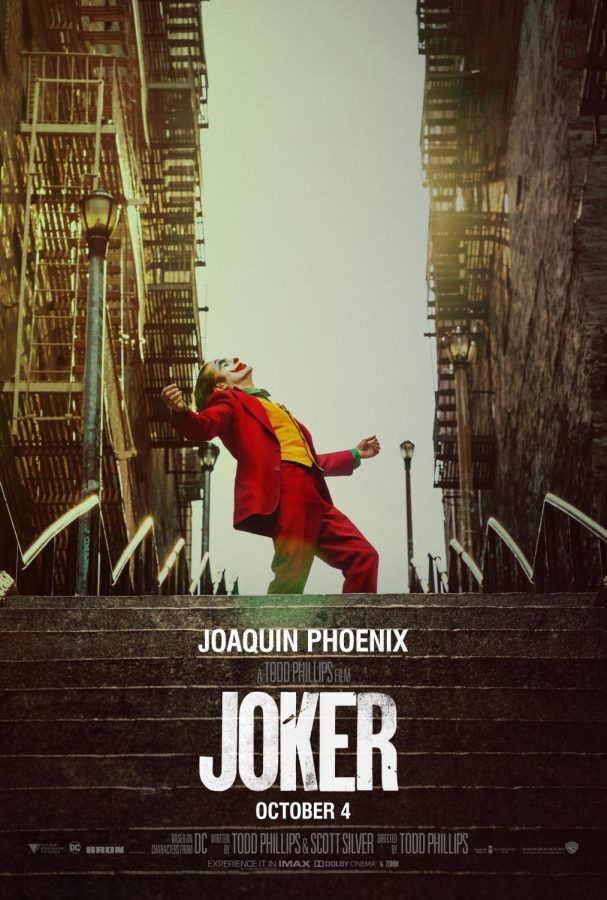‘Joker’ Delights and Disturbs
The most recent portrayal of the villain boasts a strong performance in well-done character study.
The “Joker” poster. The movie released on Oct. 4 and made $93.5 million in the U.S. and $234 million world wide in its opening weekend, breaking numerous records such as the highest gross for an R-rated movie as well as the highest gross for an October opener.
October 16, 2019
You enter a dingy looking building, lockers on one side and people playing cards towards the other. In the middle, sits one man alone. The camera zooms in slowly as he applies clown makeup. You see him in close-up, putting on an exaggerated frown. He tries to smile, but you see only pain in his eyes as he does so. He sticks his fingers in his mouth and forces himself to smile, a single tear falls down his face, blending with his blue eye makeup. There is no music, just the chatter of the radio and the low voices of those playing cards. Cut to the next scene.
This is the first scene of “Joker,” directed by Todd Phillips and starring Joaquin Phoenix as Arthur Fleck, the man who ultimately becomes the Joker, Batman’s arch-nemesis. When watching the first scene in theaters Saturday night, I was truly disturbed, but sympathetic. I felt uncomfortable seeing a man force such an unnatural expression and the sorrow hiding behind it only made me feel worse, but because of this obvious sorrow, I could tell this character was hurting.
I loved this movie. The movie was the perfect combination of a comic book property and contemporary issues of mental health, classism, and mass murderer glorification. Joaquin Phoenix truly did what he does best and made you forget he was an actor, feeling genuine fear towards him and pity for him.
There were so many times, like the first scene, where Joaquin Phoenix portrayed a disturbed man so perfectly that it was hard to hate him, but impossible to side with him. Although you wished for him to find happiness and to overcome his troubles, you couldn’t agree with how he did so.
“Joker” continues this trend of sympathetic discomfort for much of its runtime. Watching Fleck as he faces the abuses of a system that doesn’t care about him, it’s this strange kind of sympathy where one recognizes the path Fleck takes in becoming a mass murderer is the wrong path to go, but since we see him as a broken man you can understand how he got there. You don’t condone his actions, but you still feel bad for him and understand what might have pushed him to that point.
It helps that the character of Arthur Fleck does not start as an evil man. He has a litany of mental disorders, his social worker saying that he is taking seven medications at one point, and one condition causes him to burst into uncontrollable laughter regardless of how he feels. Since people do not understand this condition, people often accuse him of laughing at them or being dangerous. What’s beautifully ironic about this is that in his transformation into the Joker, he does begin laughing at them, and he does become dangerous.
But again, he does not begin this way. He cares for his mother in a way that is honestly heartwarming, giving her food even though she tells him he needs to eat. He tries to make a kid smile on the bus. He truly tries to make people happy. It’s only when he ultimately snaps after years of worldly abuses that we see his villainous side come through.
I loved Joaquin Phoenix in the movie. He had lost so much weight for the role, allowing for some disturbing contortions of his body. His transformation from broken to glamorous was convincing and you could tell all the nuances of Fleck’s simultaneous repulsion and attraction to this persona he was coming closer to.
The best way to describe Phoenix’s performance is intoxicating. When he eventually transforms into the Joker, I found myself caught up in his transformation with him. He is just so delightful to see in this state. However, this intoxication, though, grows sour as you appreciate the context. He’s a murderer, yet Phoenix makes it seem so glamorous, as if you yourself were Fleck experiencing this transformation. That’s the conflict of the viewer, you can’t sympathise with this killer, but you keep finding yourself doing so in this performance, up until the very end.
Technically speaking, I thought the movie was pretty well done. I was only familiar with Todd Phillips from “The Hangover” and there’s not much good I can say in the way of that movie’s direction. Scatterbrained would be one way to describe that movie. But here I thought his attention to detail was largely spot-on. Phillips made sure Phoenix was always the focal point, as the movie is a character study more than it is a superhero movie. There were some clever shots here and there, one where Fleck sits in the audience of a comedy club stood out in particular, zooming in on him as he laughed at all the wrong parts of the joke and looked around in confusion when others laughed. That was a really good way of conveying the disconnect he has to the audience.
The music was also well done. I heard Phillips actually sent out the screenplay to the composer first, and they filmed with the music in mind. I wasn’t familiar with this practice, but it gave the scenes a much more intentional musical feel, something Phillips said he wanted to achieve in an interview. The shift towards more glamorous music (quite on the nose in the form of glam rock) with the rise of the Joker really emphasized Arthur’s happiness in finding his purpose.
My one gripe with the movie is how overt it was, lacking subtlety often. There were so many times where the movie would show something shocking, a particular twist I won’t spoil comes to mind, and then it would explain it to you. It wasn’t so obvious as to be terrible, but it left me saying “I get it, you didn’t need to show me that.” With the twist, I had anticipated the twist a while before they showed their hand, so the additional hand holding was a bit excessive. Also, in certain scenes it was ridiculous just how upfront it was with the idea that no one cares about Arthur. I was left asking why people were acting the way they were toward Fleck, not in an expression of injustice, but in a way that seemed almost comically overdone. I was thinking, “Oh, of course! And next a piano’s gonna fall on him or something.”
This is not to discount the nuance of Phoenix’s performance, though, as he truly did make up for this gripe. I think the lack of subtlety in the surrounding movie is less of a problem when Phoenix is in every frame of this movie, acting his heart out and reveling in the role. Overall, I think this is one of the better comic book movies out there, with an intoxicating lead that made for one of the best, if not the best Joker portrayal (I’ll leave that for Ledger and Phoenix fans to argue). The only thing holding it back is a lack of subtlety that would have elevated it to perfection.

